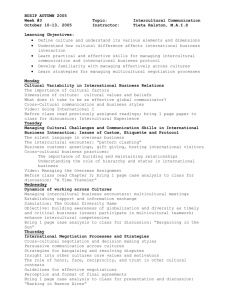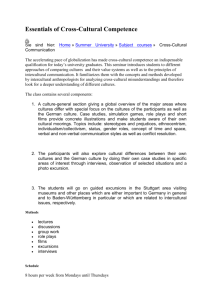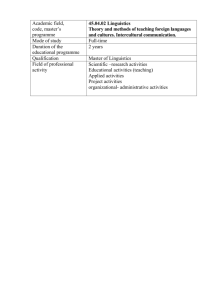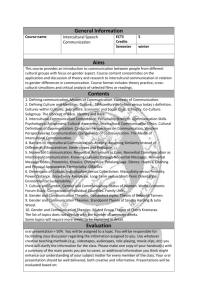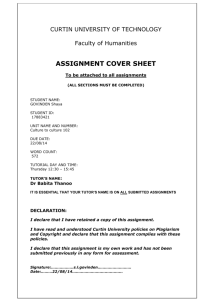Global Business and the Competitive Advantage of Intercultural
advertisement
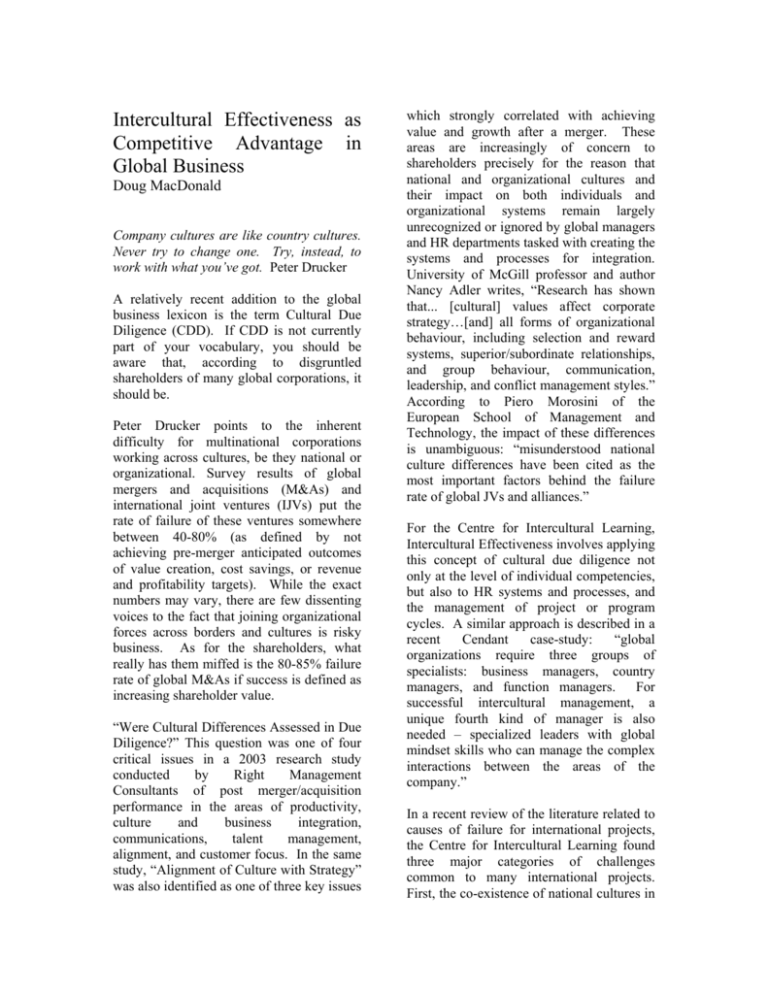
Intercultural Effectiveness as Competitive Advantage in Global Business Doug MacDonald Company cultures are like country cultures. Never try to change one. Try, instead, to work with what you’ve got. Peter Drucker A relatively recent addition to the global business lexicon is the term Cultural Due Diligence (CDD). If CDD is not currently part of your vocabulary, you should be aware that, according to disgruntled shareholders of many global corporations, it should be. Peter Drucker points to the inherent difficulty for multinational corporations working across cultures, be they national or organizational. Survey results of global mergers and acquisitions (M&As) and international joint ventures (IJVs) put the rate of failure of these ventures somewhere between 40-80% (as defined by not achieving pre-merger anticipated outcomes of value creation, cost savings, or revenue and profitability targets). While the exact numbers may vary, there are few dissenting voices to the fact that joining organizational forces across borders and cultures is risky business. As for the shareholders, what really has them miffed is the 80-85% failure rate of global M&As if success is defined as increasing shareholder value. “Were Cultural Differences Assessed in Due Diligence?” This question was one of four critical issues in a 2003 research study conducted by Right Management Consultants of post merger/acquisition performance in the areas of productivity, culture and business integration, communications, talent management, alignment, and customer focus. In the same study, “Alignment of Culture with Strategy” was also identified as one of three key issues which strongly correlated with achieving value and growth after a merger. These areas are increasingly of concern to shareholders precisely for the reason that national and organizational cultures and their impact on both individuals and organizational systems remain largely unrecognized or ignored by global managers and HR departments tasked with creating the systems and processes for integration. University of McGill professor and author Nancy Adler writes, “Research has shown that... [cultural] values affect corporate strategy…[and] all forms of organizational behaviour, including selection and reward systems, superior/subordinate relationships, and group behaviour, communication, leadership, and conflict management styles.” According to Piero Morosini of the European School of Management and Technology, the impact of these differences is unambiguous: “misunderstood national culture differences have been cited as the most important factors behind the failure rate of global JVs and alliances.” For the Centre for Intercultural Learning, Intercultural Effectiveness involves applying this concept of cultural due diligence not only at the level of individual competencies, but also to HR systems and processes, and the management of project or program cycles. A similar approach is described in a recent Cendant case-study: “global organizations require three groups of specialists: business managers, country managers, and function managers. For successful intercultural management, a unique fourth kind of manager is also needed – specialized leaders with global mindset skills who can manage the complex interactions between the areas of the company.” In a recent review of the literature related to causes of failure for international projects, the Centre for Intercultural Learning found three major categories of challenges common to many international projects. First, the co-existence of national cultures in international projects creates unique problems of communication and of achieving unity of purpose and work-styles. The second difficulty is that, despite the huge advances in communications and transportation, physical distance still causes problems, particularly related to alignment of purpose with headquarters or the home office. The third category of difficulty for international projects is the challenge they face in performing the environmental scanning function, that is, of accurately assessing and predicting trends in the economic and social/political environment that will affect the success of the project. In addition to these three general challenges, CIL’s study also identified eight critical success factors for international projects, the headings for which can be seen in the sidebar below. For Canadian companies working in the international marketplace, cultural due diligence and the associated intercultural Sidebar Critical Success Factors for International Projects 1. Recognize the pervasive influence of culture on all activities and processes 2. Balance differing management practices of foreign and local participating organizations and employees. 3. Achieve a clear and shared understanding of purposes, management approaches, and respective roles and responsibilities between participants. 4. Have the right people doing the right things at the right time 5. Maintain a strong and consistent commitment to seeing the project through to a point of sustainability. 6. Set realistic objectives and a realistic pacing of implementation schedules. 7. Be proactive in environmental monitoring and management. 8. Establish a high level of mutual trust between the participating organizations and their employees. Kealey, D.J., Protheroe, D., MacDonald, D., Vulpe, T., Readying your Organization for International Projects (in press). competencies represent real competitive advantage. Whether M&As, IJVs, vendor agreements, or most any form of international business relationship, recognizing the influence that national and organizational cultures have on alignment of strategy and purpose is one of the critical success factors for global ventures, as is actively assessing the impact of culture across all levels, functions and locations in the organization. Shareholders are not the only group with vested interest in cultural due diligence – employees and customers are all interested in seeing stronger organizational cohesion and better results. Doug MacDonald is Deputy Director and Head of Research at the Centre for Intercultural Learning, Canadian Foreign Service Institute, Foreign Affairs Canada.

